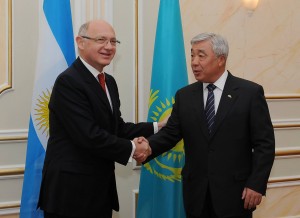 ASTANA – The foreign ministers of Kazakhstan and Argentina signed a visa-free regime agreement on May 30 in Astana, another in a series of deals with Latin American countries and elsewhere that Kazakhstan is developing to help ease travel for its citizens.
ASTANA – The foreign ministers of Kazakhstan and Argentina signed a visa-free regime agreement on May 30 in Astana, another in a series of deals with Latin American countries and elsewhere that Kazakhstan is developing to help ease travel for its citizens.
Foreign Minister of Kazakhstan Erlan Idrissov met with Foreign Minister of Argentina Hector Timerman during the latter’s official visit to Kazakhstan, the first visit of a foreign minister from a Latin American country to Astana.
The Agreement between the Government of the Republic of Kazakhstan and the Government of the Argentine Republic on visa-free travel for citizens of both countries, which the two ministers signed, is expected to give a powerful impetus to deepening comprehensive cooperation between the two countries. Last year, Kazakhstan signed a similar deal with Brasil.
Idrissov also announced that the Kazakh Foreign Ministry will continue to work actively to establish a visa-free regime with the countries of the world, in particular with another Latin American country, Chile, with which Kazakhstan last year signed an agreement on visa-free travel for the official delegations of the two countries.
Agreements on visa-free travel require ratifications before entering into force. The deal with Brasil is yet to enter into force, although Brasilian authorities have simplified the visa regime for citizens of other countries for the World Cup that is starting on June 13.
Back in Astana, Idrissov and Timerman discussed a wide range of issues of bilateral cooperation in economy, trade, investment, tourism, as well as topical issues of the international agenda.
“Our countries have much in common. We have similar views and approaches to challenges faced by humanity, be it issues of sustainable development and the environment, nuclear safety and strengthening the multi-polar world,” Idrissov said, according to the Kazakh foreign ministry press release.
“We are glad to acknowledge our mutual support in various UN agencies, and I am especially grateful to my colleague for Argentina’s support for Kazakhstan’s candidacy for non-permanent membership of the UN Security Council in 2017-2018. The support of your country is very valuable for us, and we intend to defend our common interests, while being a part of the UN Security Council,” Idrissov said.
The two ministers also focused on developing cooperation in trade, investments, agriculture and innovations, where there is a great unexploited potential.
“We are pleased that Argentina is planning to send a large business delegation during the second half of this year. From our side, we will prepare a busy schedule for Argentinean business people so that they could start substantive cooperation with their Kazakh counterparts,” Idrissov noted. He also announced plans to establish a bilateral commission on trade and economic cooperation and the ongoing negotiations on Argentina’s support of Kazakhstan’s accession to the WTO.
Timerman, in turn, noted the dynamic development of bilateral relations and confirmed the interest of the Argentinean side in cooperating in the mining sector, agriculture and nuclear industries. He noted the special importance of the first visit of a Latin American foreign minister to Kazakhstan and the importance of the visa-free agreement for the establishment of direct contacts between the two peoples.
One day earlier, Prime Minister Karim Massimov and Speaker of the Senate Kassym-Jomart Tokayev also met with Hector Timerman.
Tokayev, in particular, proposed establishing direct ties between the Parliament of Kazakhstan and Argentine’s National Congress. They also noted the need to establish groups of cooperation in the upper chambers of the two parliaments.
Tokayev also called on Argentina to actively participate in EXPO 2017 in Astana and expressed hope Buenos Aires will support Kazakhstan’s candidacy for the non-permanent membership of the UN Security Council. According to a Senate press release, Timerman said Kazakhstan deserves such a status and its active involvement in the workings of the UN will help change the things for the better, including in conflict resolution.
